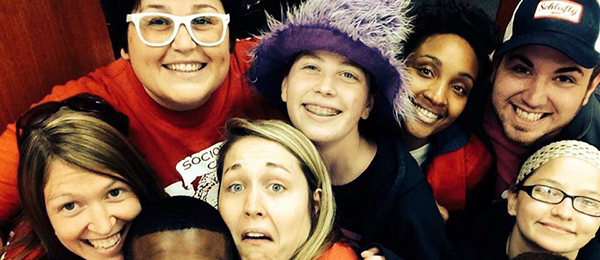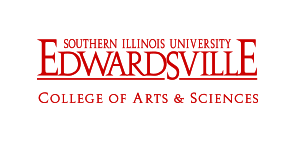|
|
|
The Sociology Program invites you to see....
|
|
|
|
Thoughts from the Chair
|
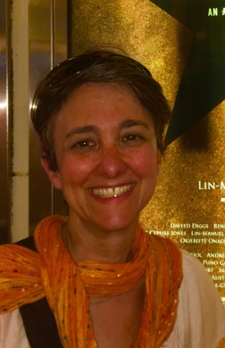 |
|
|
First, let me invite you to our Alumni event. The event will be April 20 from 5-7 p.m. at Sugos in Edwardsville. We are hosting the event with Anthropology and Political Science. We would love to see you there. You should be receiving an evite soon.
Now, here's a little of what I've been thinking about lately. There is a big push by government officials to reduce funding to the humanities and the social sciences and to instead put our money towards majors we think will help businesses make more money. This push suggests that what’s best for us, what will make us most happy as citizens, is that we think of ourselves first as consumers. Will reducing ourselves to consumers lead to happiness like government officials suggest?
I won’t deny it. When I buy something new, it’s true that I get a burst of adrenaline that I interpret as happiness. What’s also true is that the little burst is not enduring, and soon I am left not feeling very fulfilled. Research backs that up. Consuming more than we need tends to leads to unhappiness and, more importantly, tends to make us not very kind to others.
Many of us intuitively know that consuming doesn't lead to fulfillment, yet we follow the treadmill of consumerism anyway. What’s up with that?
The inability to do what is best for us, as individuals or as a society, is not a defect in our moral character or something that can be cured. We humans face serious limitations. Limitations are in our DNA. For example, we have blind spots in our eyesight. (For Pete's sake, we can’t see behind us.) Furthermore, visible light is only .0035 percent of the electromagnetic spectrum. Cognitively, we are unable to process all the information given to us and so we ignore much of the phenomenal world. Indeed, research shows that most of our decisions are made with emotions and habit, and very few of them are made using rationality.
An example of our irrationality is the following. I interviewed a pre-service teacher about 5 years ago and asked her about racism. She was a young, white woman, as most pre-service teachers are, and I asked her if she felt racism towards blacks was a problem here in the United States. She confidently said, "No." When I asked her to explain, the student said she had never seen racism, and none of her white friends had either. She reasoned it must not exist. Though it seems completely irrational to deny the existence of something just because we, ourselves, have not witnessed that something, we use this logic all the time.
Again, cognitive limitations are not the problem. They are an inevitable feature of the human condition. The problem is when we, as humans, DENY that we have limitations. The problem is when we pretend that we understand things clearly and, in fact, better than others so we ignore diverse perspectives when making policy decisions that affect groups that are not us.
(Cue in the dramatic music.) We are a diverse group of individuals who have diverse experiences, opportunities, and ways of viewing the world. Many of us don’t know what it’s like to be a refugee, an immigrant farmer, or a rape survivor. Given that humans will always be limited in our cognitive abilities, we need more of the social sciences, the arts, the humanities and yes, sociology. Not less. These disciplines won’t cure us of our limitations, but they will remind us that we are constrained. And, embracing our constraints will help us create a better society that sustains and nurtures us, all of us, regardless of who we are or where we're from.
Dr. Linda Markowitz
Chair, Sociology Program
|
|
|
|
Course Bio: Internship Class |
|
| |
|
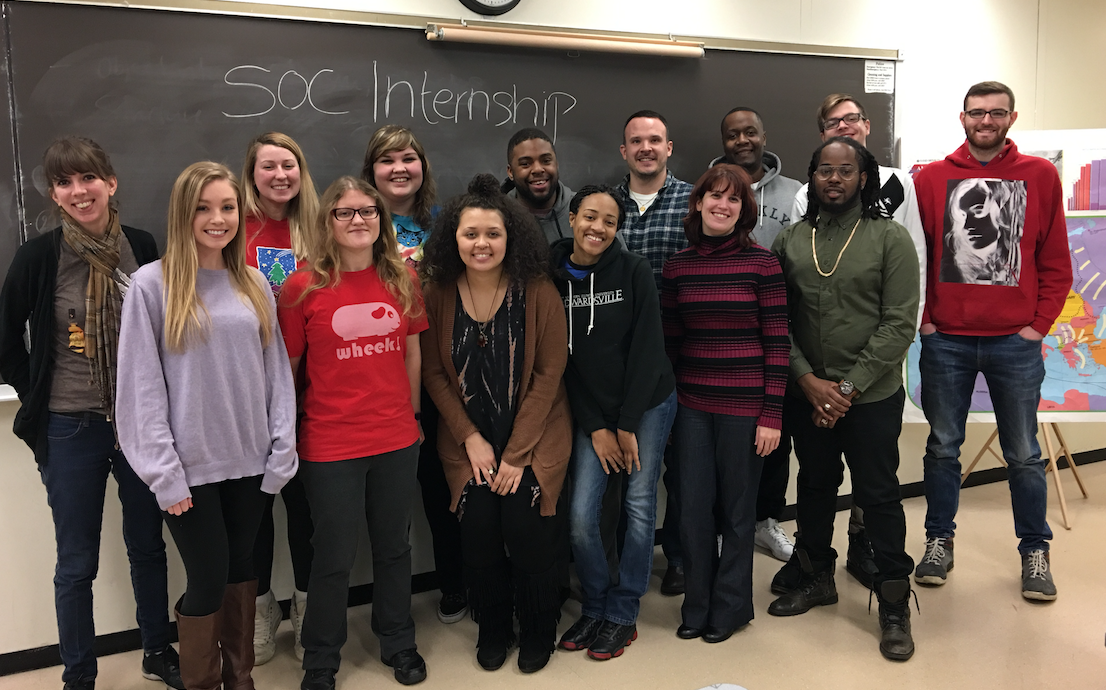
Dr. Marv Finkelstein (not featured in photo) has been at SIUE since 1986. Marv was instrumental in building the applied offerings in the Department, beginning the Employment Relations (ER) Program. Last year, we added a new applied program, Diversity and Social Justice (DSJ). Marv is heading up the first internship class for the students in both the ER and DSJ programs. Here, he talks a little about what the new combined internship class is like.
Sociology 433: The Internship Class (A Marriage Made in Sociology Heaven: DSJ and ER)
We have been working to develop a new concentration in Diversity and Social Justice, and to combine with the longstanding applied component of our program, Employment Relations. We have recognized that many of our students are especially interested in pursuing jobs and careers in not-for-profit and voluntary organizations. These organizations most often are committed to advancing social ideals and goals. They often serve disadvantaged populations and communities. Those students who wish to work in these organizations will benefit from this combined applied program because they will also be exposed to the employment and job related skills necessary to succeed in these contexts. It’s certainly great to have the desire to advance the goals of diversity and social justice, but now those students who have these interests can develop a background that includes both DSJ and ER. And they can do an internship that combines both as their senior assignment. Likewise, we have a successful history and record of sociology students benefiting from focusing on employment relations and doing an internship as their senior assignment. Those students will now also benefit from being exposed to the highlighted importance of equity and diversity in the workplace. Every workplace must pay close attention to issues regarding discrimination, diversity and inclusion in the employment setting. So, those who want to improve employment relations in the workplace must always seek to effectively address these issues. By doing so, they advance the ideas of diversity and social justice.
The result is a marriage made in sociology heaven: a concentration in DSJ and a concentration in ER that can be combined in Soc. 433, the required internship course that has been strengthened by the synergetic benefits of both concentrations. This marriage will produce sociology graduates who have the skills necessary to become successful professionals in a variety of employment contexts.
|
|
|
Get to Know Our Faculty: Dr. Sandra Weissinger |
|
| |
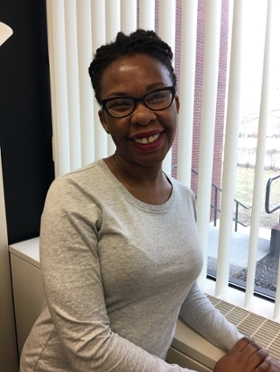 |
|
|
|
1) You’ve been active in applying sociology in the St. Louis and Metro East Area. Can you tell us about some of your most exciting projects?
Since moving to the region, I have been involved in a variety of everyday sociology practices. These practices have brought me into contact with great people and organizations that regularly engage in tactics to reduce discriminatory practices in the region. From writing letters to politicians with ad hoc groups of activists to attending a liberation-based fashion show to support the entrepreneur efforts of women recovering from addiction and assault, I have really enjoyed my time as an active, on-the-ground sociologist.
The nonprofit Magdalene St. Louis assists women who have survived sexual exploitation, violence and addiction. One project of the organization is Bravely. The fashion line provides employment training and living wage jobs to the residents. I feel very fortunate to serve on the executive board where we work through budgets, programming, hiring, and promotion of the programs offered by the organization.
I also enjoy my work with the Community Gospel Choir of St. Louis. I am new to the group, but I joined because of their dedication to breaking down racial, cultural and economic barriers in the St. Louis community through a diverse choir membership and inviting musical concerts.
2) You teach several classes that touch on issues of racial oppression. Can you tell us some of your biggest challenges in talking about racial oppression with students?
For those students who are willing to see their roles in the continuing significance of race, racism, and discrimination, my classes are eye-opening and empowering. In several of these classes, I have taken students through an Anti-Racism Twelve-Step program – akin to what an addict would go through to address issues with substance abuse. Because of the deep levels to which racism penetrates, even infecting and affecting people of color and their racial identities, it is important to work the program. By starting with the individual, we can more easily start to see how the structures that govern society are infected and inflicted as well.
As one can imagine, there will always be those students who are apathetic about everything, not just racism. They are harder to reach. But by taking everyone through the program, even the most recalcitrant starts to see their role, however marginal, in perpetuating racism.
3) What is your favorite part of teaching?
I secretly (and not so secretly) root for students who work hard not because they want a grade, but because they genuinely want to learn, and every success rebuilds what years of heartache have broken down. I have a soft spot for nontraditional students often for this reason. I think it is brave to come back to school. I think it is brave to strive for something more.
4) What has surprised you most about teaching?
How funny students are! Some people have personalities that are fun-loving and kind, and that really helps when I have to explain something hard like white privilege. These students have taught me a good deal about relaxing, being comfortable in my own skin, and staying with my own vulnerabilities in order to convey important messages.
5) You moved here from New Orleans, do you think the food in this region compares to what you had in New Orleans?
Nothing will ever compare to New Orleans. That city is in a league of its own. More than the food, the culture is both heartbreaking and heart-affirming. In short, the regions are too different to compare.
6) What’s one of your favorite places to eat in the area?
Since moving to the region, I have really done a good job of honing my culinary skills. Therefore, I think my house (or wherever I am cooking) is my favorite place to eat. I can make so many different things – from baked items (I make a mean apple-pecan cake) to my Hoppin’ John. I am very delighted with my newly emerging skills. (Thanks, New Orleans. Friends used to cook with me down there, and I bring those memories with me every time I enter the kitchen.)
|
|
|
Meet Alum: Thomas Harrell |
|
| |
|
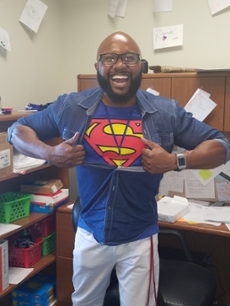 |
|
|
Sociology was the beginning of my journey to question everything that happens as it relates to people and their interactions. To be honest, sociology was a subject that I knew nothing of and didn't believe I would have any interest in during my first visit to SIUE in 2000. However, after looking at the brochure and speaking with the professors, I soon learned that sociology was something that would become a lifelong study for me.
Upon graduation with my BA in Sociology from SIUE, I worked as an assistant manager for Walgreens before stumbling across a position as a counselor for the Job Corps program. Job Corps is an educational program for impoverished 16-24 year olds who need a high school education, a trade or both. It was the teachings in sociology that helped me to help the students in that program. Because of my sociology degree, I could understand what backgrounds and environment my students were coming from as well as the hurdles that many on them had to overcome to become successful.
While working for Job Corps over an eight year period, I attained two MA degrees, one in professional counseling and the other in school counseling. I knew that I had found my calling, and teaming the education from SIUE’s sociology department and my knowledge in counseling proved to be very successful in making a difference in the lives of students and young adult I work with. I also opened a home health care company for low income/disabled adults. I give total credit to the study of sociology to opening my eyes and heart to the needs of the youth, seniors and disabled population.
Today as a 6 th grade counselor and a business owner I can say that Sociology has prepared me to advocate, counsel and love those that I work with. Today I can better assist all I come in contact with due to my understanding of the social constructs that can impact different social groups, and I owe it all to making the life changing decision to become a Sociology Major at SIUE.
|
|
|
Applied Sociology Senior Showcase: Crystal Martin |
|
| |
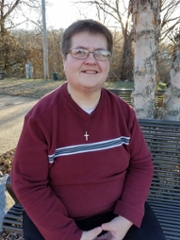 |
|
|
|
The internship class has more students this year than ever before. We are excited that students are pursuing the applied program. Here is one of our students, Crystal Martin, talking about her experience with her internship.
My interest in the study of people is what drew me to Sociology when I first came to SIUE. My love of all things business is what drew me to Employment Relations. I have loved learning the inner workings of organizations and how the people inside of the organization shape a variety of things that make that organization successful or not. I love using the study of sociology to interpret the different experiences that I have had in the workplaces in my past.
For the Employment Relations exit requirement, I am currently doing an internship at Linc, Inc. in Belleville. Linc is an organization that helps people who are disabled to live independently. Linc provides five core services as one of 22 centers for independent living in the state of Illinois. Linc provides services for persons of all ages and all types of disabilities.
I have been involved in educational meetings at the local schools and involved with consumers coming out of the nursing home. I have also been involved in doing minor human resource projects involving payroll and benefits. It has been interesting to observe the interactions between our staff and the consumers that we serve.
My favorite part of the internship so far has been seeing the different technologies that help people with varying degrees of disabilities depend on themselves to do tasks and not have to rely on others.
|
|
|
General Sociology Senior Showcase: Jade Eastling |
|
| |
|
 |
|
|
We'd like to introduce you to one senior: Jade Eastling has been pursuing the question of major choice among college students for the last year. Here she explains a little about her project.
Choosing a college major is a very important step most people take in their life. This is one step that shapes what type of life you will live. Our majors may determine what salary we make, how satisfied we are with working in that field, and what our job stability is. But how do individuals make this huge decision of choosing a major? Who chooses more professional degrees over the less professional degrees? Knowing what factors go into choosing a major helps us see the opportunities different groups have. In my senior capstone course, I asked how social class affects student's choice of major. I completed a quantitative research method approach, specifically a questionnaire. To do this, I gathered data from current SIUE students from Interdisciplinary Studies (IS) courses. I gave students a survey asking how they made their choice of major. It is significant to know what factors are present when individuals make a choice in major because the factors set the tone for how we make it in life and the things that we have access to.
|
|
|
Thinking about Sociology: Books You May Enjoy |
|
| |
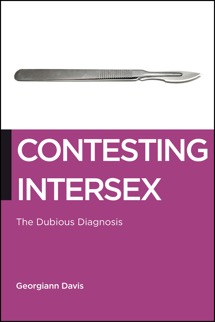 |
Contesting Intersex by Georgiann Davis, one of our very own previous faculty members
"Davis draws on interviews with intersex people, their parents, and medical experts to explore the oft-questioned views on intersex in medical and activist communities, as well as the evolution of thought in regards to intersex visibility and transparency. She finds that framing intersex as an abnormality is harmful and can alter the course of one’s life. In fact, controversy over this framing continues, as intersex has been renamed a ‘disorder of sex development’ throughout medicine." |
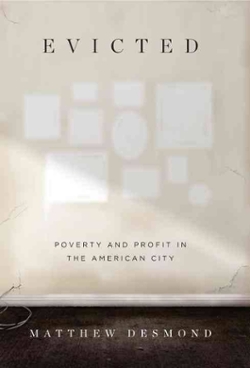 |
Evicted by Matthew Desmond
"In this brilliant, heartbreaking book, Matthew Desmond takes us into the poorest neighborhoods of Milwaukee to tell the story of eight families on the edge. Arleen is a single mother trying to raise her two sons on the $20 a month she has left after paying for their rundown apartment. Scott is a gentle nurse consumed by a heroin addiction. Lamar, a man with no legs and a neighborhood full of boys to look after, tries to work his way out of debt. Vanetta participates in a botched stickup after her hours are cut. All are spending almost everything they have on rent, and all have fallen behind." |
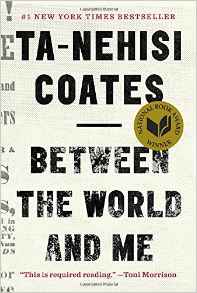 |
Between the World and Me by Ta-Nehisi Coates
"In a series of essays written as a letter to his son, Coates confronts the notion of race in America and how it has shaped American history, many times at the cost of black bodies and lives. Thoughtfully exploring personal and historical events, from his time at Howard University to the Civil War, the author poignantly asks and attempts to answer difficult questions that plague modern society. In this short memoir, the Atlantic writer explains that the tragic examples of Michael Brown, Trayvon Martin, and those killed in South Carolina are the results of a systematically constructed and maintained assault to black people—a structure that includes slavery, mass incarceration, and police brutality as part of its foundation." |
|
|
|
|
